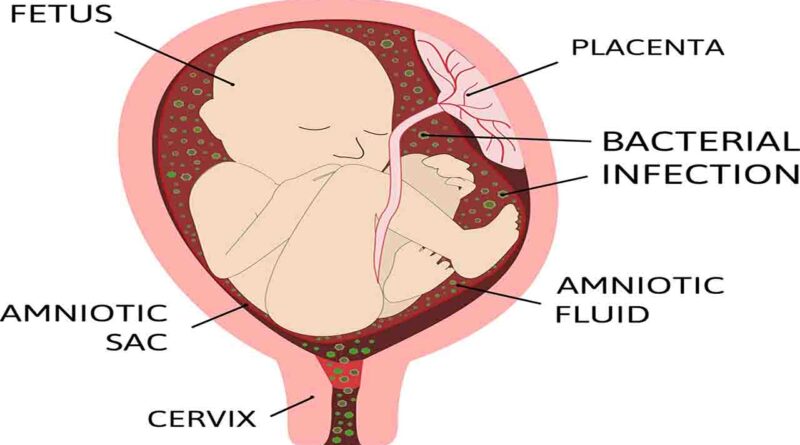Chorioamnionitis During Pregnancy | Intrauterine infection
Intrauterine infection, also known as chorioamnionitis, is when the membranes that surround the baby in the womb are infected.
Chorioamnionitis is a serious condition in pregnancy when the membranes that surround the fetus and the amniotic fluid are infected by bacteria. It can cause complications for both you and the fetus.
What is chorioamnionitis?
Chorioamnionitis (intra-amniotic infection) is a serious infection that affects a person during pregnancy. It gets its name from the two membranes that surround a fetus in your uterus: the chorion and the amnion.
This infection occurs when bacteria enter any of the tissues or membranes around a fetus. This includes:
- Chorion (outer membrane).
- Amnion (inner membrane).
- Placenta.
- Amniotic fluid.
Treatment usually involves antibiotics, but it may also mean your pregnancy care provider delivers your baby early. It can lead to life-threatening complications in both you and your baby if it’s left untreated.
What causes chorioamnionitis?
Several things may cause chorioamnionitis. The most common cause is bacteria moving up through the vagina and cervix. It can also come through the maternal bloodstream through the placenta.
Infection may also be a complication of invasive procedures such as amniocentesis or fetoscopy.
These procedures are sometimes recommended if:
- your routine screening and diagnostic tests have found that your baby may have a medical problem
- your baby may have a condition that can be diagnosed or treated in the womb or soon after birth.
Your healthcare professional will not carry out these procedures without your permission (consent). They will also talk to you about the benefits and risks so you can decide what is best for you and your baby.
How common is chorioamnionitis?
Chorioamnionitis affects around 1 to 4% of full-term deliveries (if your baby is born after 37 weeks of pregnancy). It is much more common in premature births (if your baby is born before 37 weeks of pregnancy) where it affects 40-70% of births.
What happens if I get chorioamnionitis?
An intrauterine infection can cause the following complications:
- preterm prelabour rupture of the membranes (waters breaking early)
- premature birth
- stillbirth
- infections in the mother after birth
- heavy bleeding after birth
- neonatal sepsis (infection in the baby)
- chronic lung disease in the baby
- brain injury leading to cerebral palsy and other neurodevelopmental disabilities.
This sounds scary but remember that midwives and doctors routinely look for the signs of chorioamnionitis if you experience any unusual symptoms during pregnancy.
Tell your midwife or doctor if there is anything that you’re worried about. Do not worry if you’ve talked about it before and don’t be concerned about whether you’re wasting anyone’s time. This is your pregnancy and it’s important to trust your own instincts if you feel something isn’t right.
What are the symptoms of chorioamnionitis?
Sometimes there aren’t any symptoms and healthcare professionals may only suspect chorioamnionitis if your waters break early (preterm prelabour rupture of membranes or PPROM).
If you do have symptoms of chorioamnionitis, they can include:
- high temperature
- pain in your abdomen and tenderness over the womb (in your pelvic area)
- your heart suddenly beating much faster (tachycardia)
- your baby’s heart beating too fast.
You cannot feel your baby’s heartbeat when you are pregnant). Some people have tried using hand dopplers at home to listen to their baby’s heartbeat. We do not recommend this. Contact your doctor or midwife if you have any concerns about your pregnancy. Find out more about why we do not recommend using hand-held dopplers at home.
Vaginal discharge
It’s normal to have more discharge in pregnancy. But call your midwife if you have vaginal discharge and:
- it smells unpleasant or strange
- it is green or yellow
- you feel itchy or sore around your vagina
- you have pain when you wee.
If you have any of these symptoms, speak to your healthcare team as soon as possible as you may need treatment.
Urinary tract infections
Urinary tract infections (UTIs) can lead to chorioamnionitis if they are not treated. Find out more about the symptoms of a urinary tract infection.
Women do not always have symptoms of UTIs. This is one of the reasons why you’ll be asked to give a urine sample during your routine antenatal appointments.
What increases the risk of an intrauterine infection?
There are some things that increase the risk of infection. This includes if you:
- smoke during pregnancy
- drink alcohol or take illegal drugs during pregnancy
- have a sexually transmitted infection, such as trichomoniasis, chlamydia, gonorrhoea, syphilis, or HIV
- have group B strep (GBS)
- have bacterial vaginosis (BV).
Bacterial vaginosis is a common cause of unusual vaginal discharge. It’s caused by a change in the natural bacteria in your vagina. BV is not a sexually transmitted infection (STI) but you’re more likely to get an STI if you have BV. BV can be triggered by sex.
Find out more about sex in pregnancy.
Complications during labour can also increase the risk of infection. For example, the risk increases if:
- it takes longer than 24 hours to go into labour after your waters break (called prolonged rupture of membranes)
- you need multiple internal exams during labour
- you have a weak cervix
- you have a long labour
- your baby poos (known as meconium) during labour, which goes into the amniotic fluid.
Infections that could move to the womb include E. coli and Group B Streptococcus (GBS), bacterial vaginosis, chlamydia, trichomonas, gonorrhoea, syphilis, and HIV.
Can I prevent getting an intrauterine infection?
There are some things you can do to try to avoid an intrauterine infection:
- Don’t smoke, drink alcohol, or take drugs.
- Speak to a GP or your midwife if your vaginal discharge changes.
- Go to all your antenatal care appointments.
- Get tested if you have any reason to believe you may have an STI. You are not routinely tested for STIs as part of your antenatal care.
- Use water and plain soap to wash your genital area.
- Don’t use perfumed soaps, bubble baths, shampoo, or shower gel in the bath or use vaginal deodorants, washes, or douches. This will help you prevent bacterial vaginosis.
- Contact your doctor or midwife if you have any symptoms of a urinary tract infection.
Your doctor and midwife will only ask you to do an internal exam after you have gone into labour (unless there are any concerns during your pregnancy). Find out more about internal exams during pregnancy.
You might do everything you can to avoid an infection during pregnancy but still have difficulties. Try to remember that getting an infection during pregnancy is not your fault.
If your waters break early
The main way that doctors prevent chorioamnionitis is to give you oral antibiotics if your waters break too early (also known as preterm prelabour rupture of membranes or PPROM).
This can help to reduce the risk of an infection getting into the womb. Antibiotics can also help delay labour, which gives your baby more time to develop in the womb.
There is not enough evidence to suggest that giving antibiotics to women if their waters break before going into labour at 36 weeks or more will prevent infection. But treatment may benefit some women. Your doctor or midwife will talk to you about what they think is the best thing to do in your personal situation.
How is chorioamnionitis treated?
It is not always easy to spot an infection because there may not be any obvious symptoms. If your healthcare team think you have an infection, they will either do a blood test or a vaginal swab test.
If you are diagnosed with chorioamnionitis, then you will probably be admitted to hospital for intravenous antibiotics. These are antibiotics that are administered directly into a vein so that they can enter the bloodstream immediately. This can help prevent complications for you and your baby. You may need to keep taking antibiotics after your baby is born.
How will the infection affect how I give birth?
Your healthcare team may talk to you about having an induction or augmentation of labour. This means trying to stimulate the womb to increase the frequency, duration and intensity of your contractions. This will help your labour progress. Your healthcare professional may:
- break your waters (if they haven’t already), which is known as an amniotomy
- put you on an oxytocin drip.
You may be recommended to have electronic fetal monitoring during labour. This will help the healthcare team keep an eye on your baby’s health.
Delivering the baby urgently by cesarean section doesn’t help treat the infection. You’ll usually only be offered a c-section if there are other reasons why it will benefit you or the baby.
What will happen to my baby after they are born?
If you have chorioamnionitis, there is a risk that your baby may have an infection. Your healthcare team will assess your baby’s health immediately after they are born and do some tests, including blood tests.
Your baby may be given antibiotics and may need to spend some time in the baby unit in the hospital.
Your healthcare team will talk to you about your baby’s condition, the treatment options available and the benefits and risks of these options.
You can usually still breastfeed your baby if they have an infection or are at risk of developing an infection. Your healthcare team can support you to do this. If you can’t breastfeed (for example, if your baby is too poorly at the moment), the healthcare team can help you express if that’s what you’d like to do.
What are the complications of chorioamnionitis?
If you have a serious case of chorioamnionitis or if it goes untreated, some of the complications include:
- Infections in your pelvic region and abdomen.
- Endometritis.
- Blood clots in your pelvis or lungs.
- Sepsis (a life-threatening blood infection).
Your newborn baby could also have complications from a bacterial infection, including:
- Sepsis (a serious blood infection).
- Meningitis (brain and spinal cord inflammation).
- Pneumonia (lung infection).
Chorioamnionitis is a serious condition during pregnancy. While you may not be able to control it, there are some things you can do like recognize signs of the condition and share all of your pregnancy symptoms with your pregnancy care provider. Treatment typically involves antibiotics, but it may also mean your baby will be born early. Discuss your diagnosis with your provider and be sure to ask any questions you have.
See this also –
- What Is a Chemical Pregnancy?
- Breech Position | What It Means if Your Baby Is Breech
- Fifth Disease During Pregnancy
- Gestational Diabetes and Pregnancy
- Positive Parenting Affirmations to Boost Your Mental Health
- Implantation Bleeding: When It Happens and What It Looks Like
- Diagnosis and Management of Clinical Chorioamnionitis




